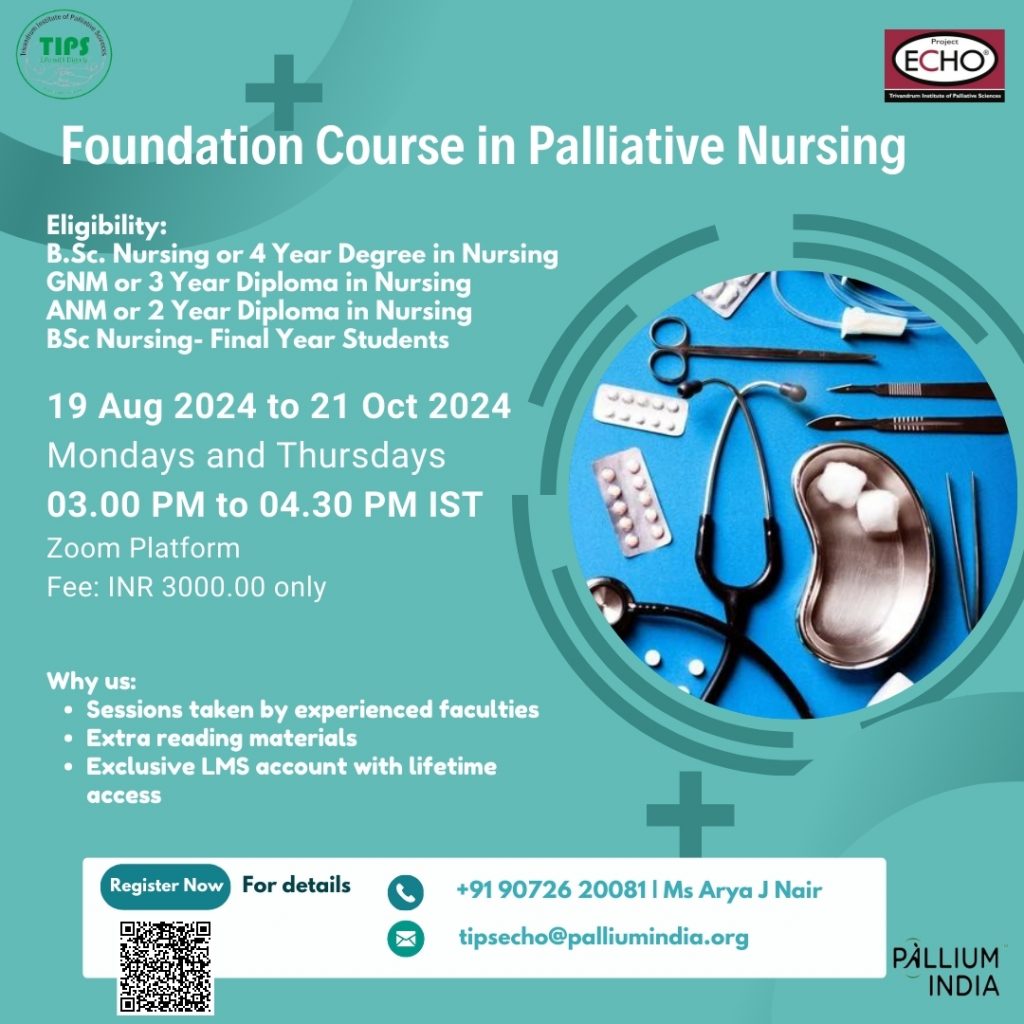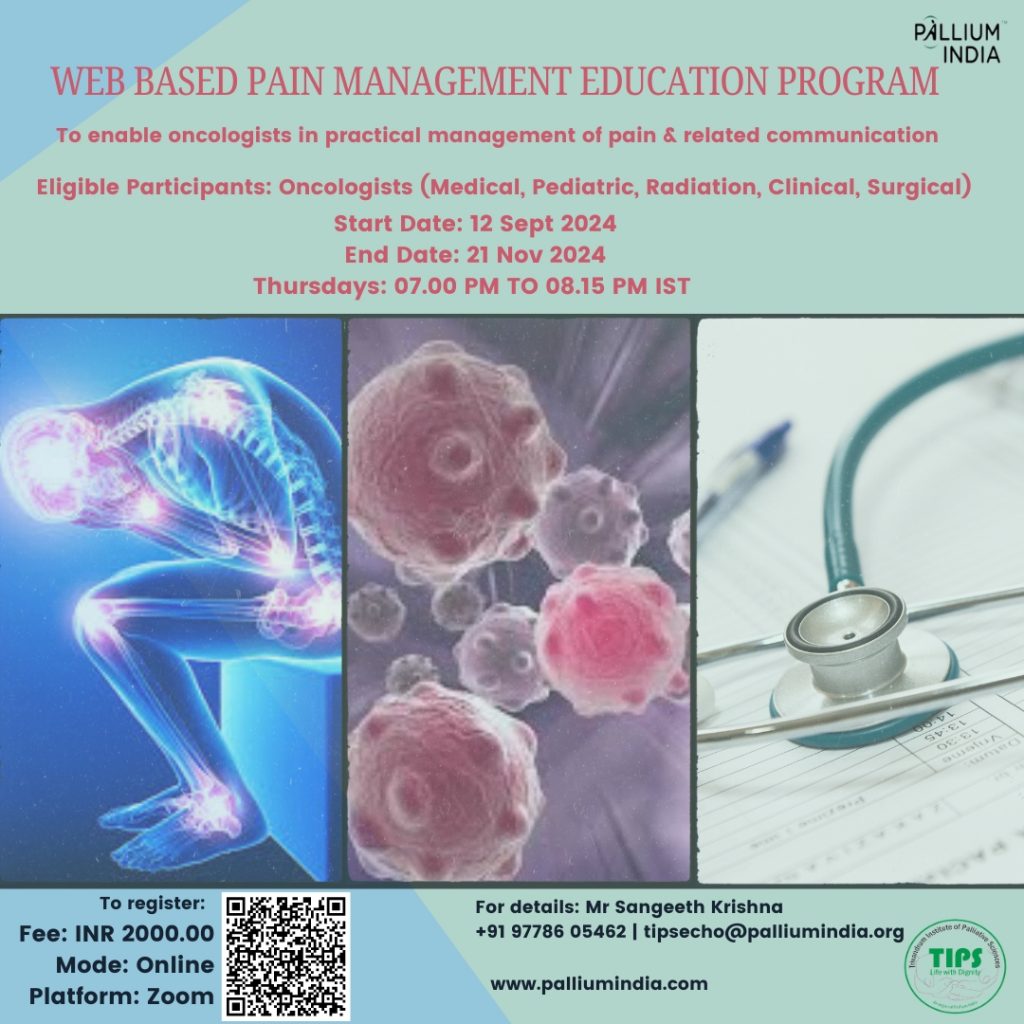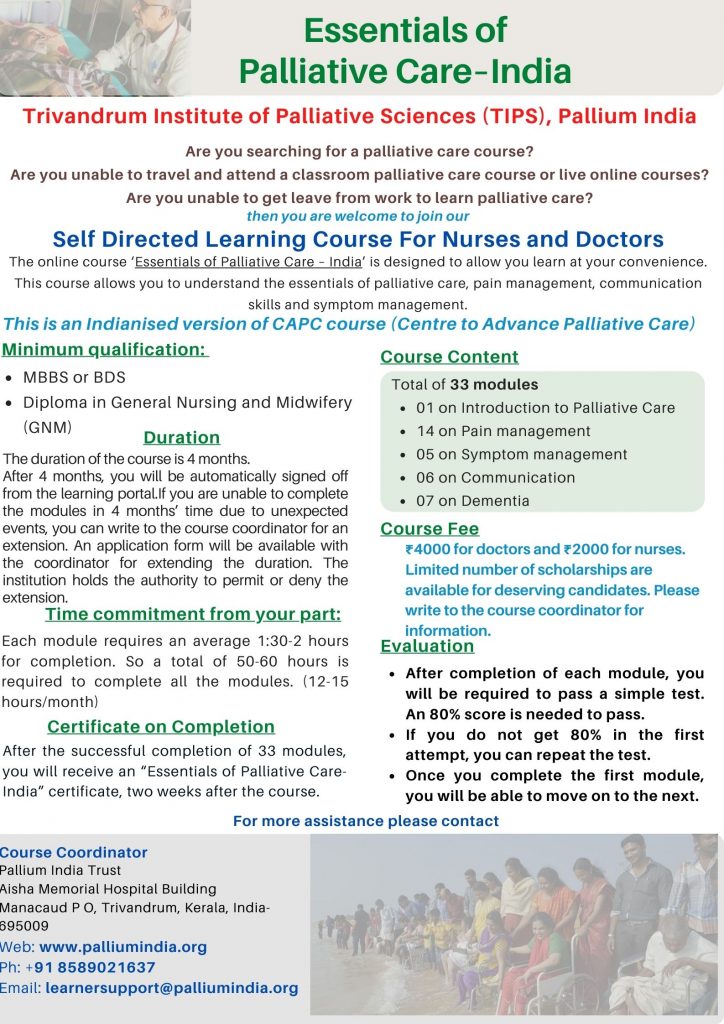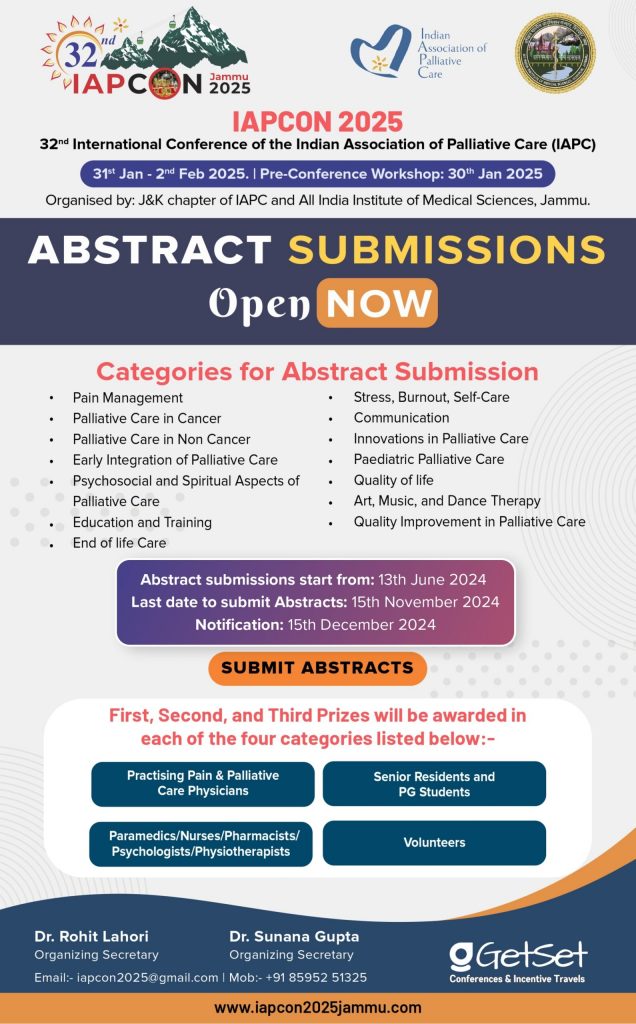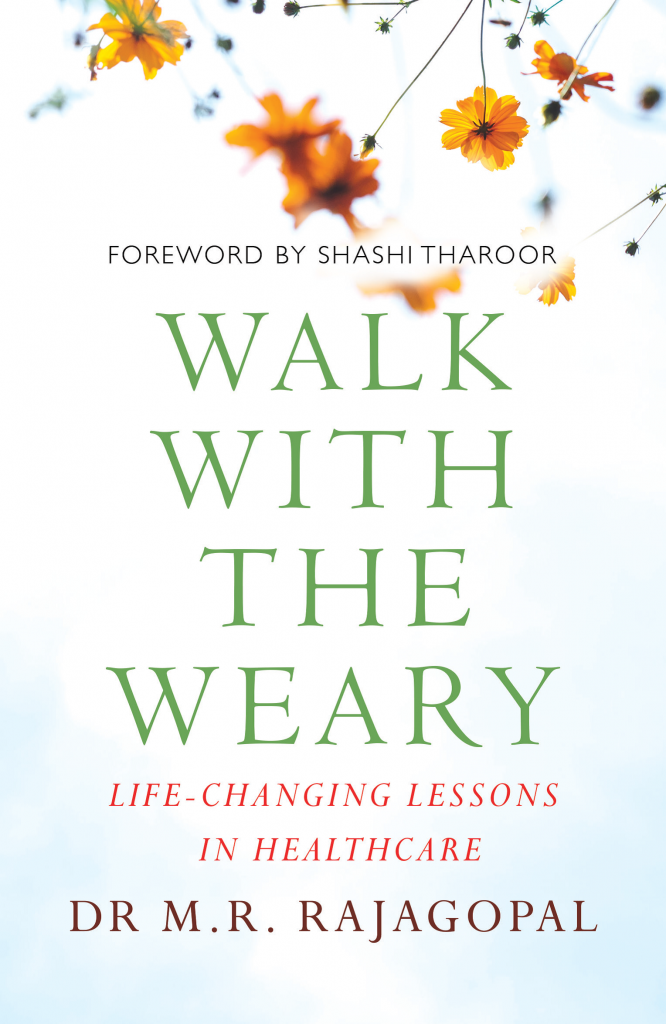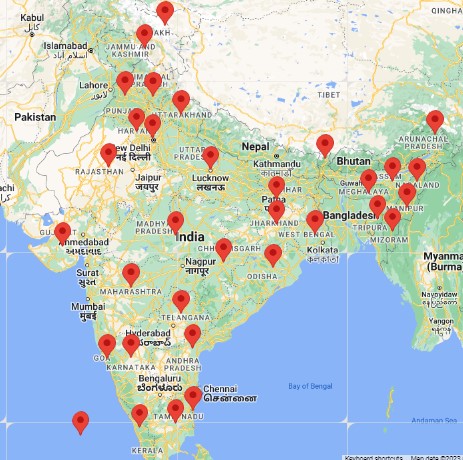August 2024


Dear friends,
As we write this, Wayanad district in northern Kerala has been hit by massive landslides, following incessant rains. More than a hundred people have lost their lives and many more are missing or injured. Homes, roads, trees were washed away in a matter of minutes. Rescue efforts are underway, even as more rain is predicted in the coming days.
All of us at Pallium India stand with the people of Wayanad and we are ready to do whatever we can to render support, in this extremely difficult time. We have reached out to our palliative care colleagues in Wayanad and will work with them to understand how best we can support them.
Welcome to a new edition of Pallium India’s newsletter. Thank you for joining us. Here you can find updates from the palliative care world, upcoming events including training for professionals and volunteers, interesting articles, career opportunities and so on.
. Read previous issues of the newsletter. Ask your friends to subscribe .
In case you missed our webinar Let’s change the Ending: A Conversation about Dying well, on July 11, 2024, or would like to watch it again, here is the recording:
Any person above the age of 18 can make an Advance Medical Directive or Living Will to plan for a time in the future when they might no longer be able to take decisions about their healthcare.
This 90-minute webinar brought together experts from medicine, law, public health, end-of-life care, and human rights, who shared their expertise, experience and perspectives.
Speakers: Dr M R Rajagopal, Dr Dhvani Mehta, Dr Roop Gursahani, Dr I P Yadev, Dr Parth Sharma
Introductory remarks: Dr Sushma Bhatnagar
Moderator: Smriti Rana
We thank everyone who joined the webinar, participated actively in the discussions, raised questions and shared their own knowledge and experiences.
Let’s Change the Ending: A Conversation about Dying Well was an initiative by the Model Palliative Care Division at the Government Medical College, Kollam, in collaboration with Pallium India and Vidhi Centre for Legal Policy, and supported by Indian Association of Palliative Care (IAPC).
Follow us for palliative care news, views and updates
NATIONAL

In pursuit of palliative care at the highest point of the nation, Ladakh
In April 2024, Pallium India’s Regional Facilitator, Syed Askari, and Head of Facilitation, Shalini Arora Joseph, travelled to the highest point of habitation in India – the Union Territory of Ladakh. The objective of the visit was to explore the availability of palliative care services to this land where so many Indian wars have been fought.
Ladakh has a relatively small population of 2.7 lakh, with only two districts – Leh & Kargil. Medical services are provided primarily by two tertiary hospitals – The Sonam Nurboo Memorial Hospital (SNMH) in Leh, and the Kargil District Hospital.
Syed and Shalini met the Mission Director of National Health Mission (NHM) Ladakh – Dr. Motup Dorjey and discussed the possibilities of partnering with the government healthcare facilities to enhance palliative care services.
Meeting people where they are, when they need it – Taking Palliative Care to the margins.
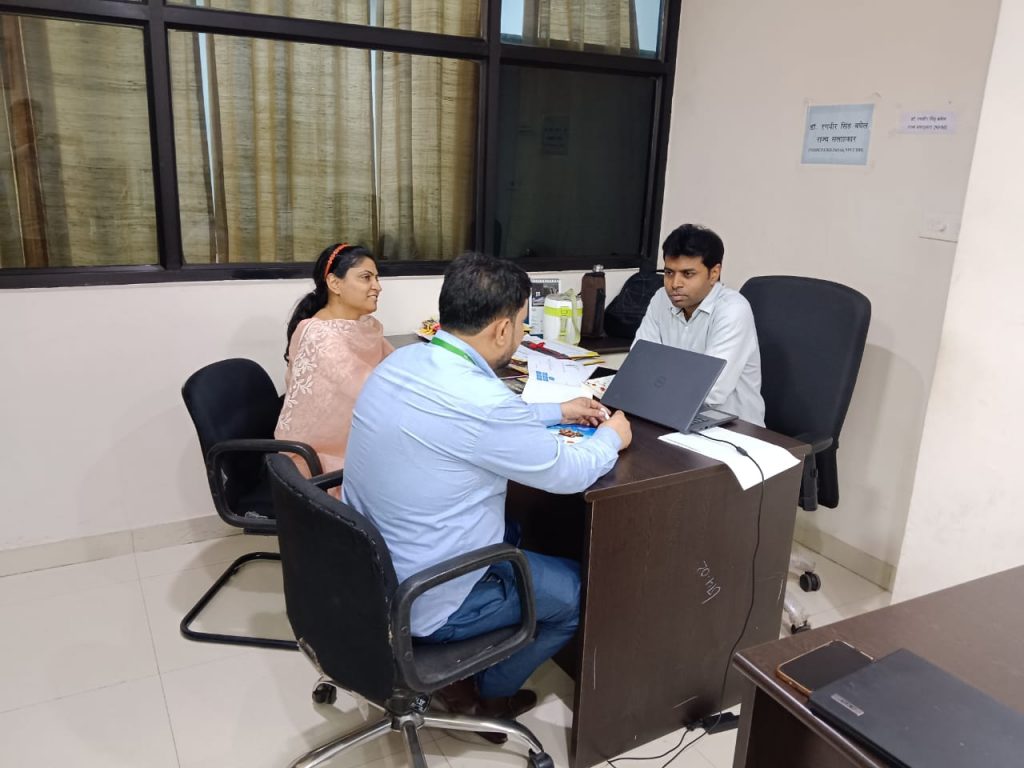
In May 2024, Dr. Shilpa Khanna from Sangwari and Syed Askari, Regional Facilitator from Pallium India, travelled to Chhattisgarh to assess the landscape of palliative care access in the state and explore ways of working together.
Improving access to pain relief in Mizoram
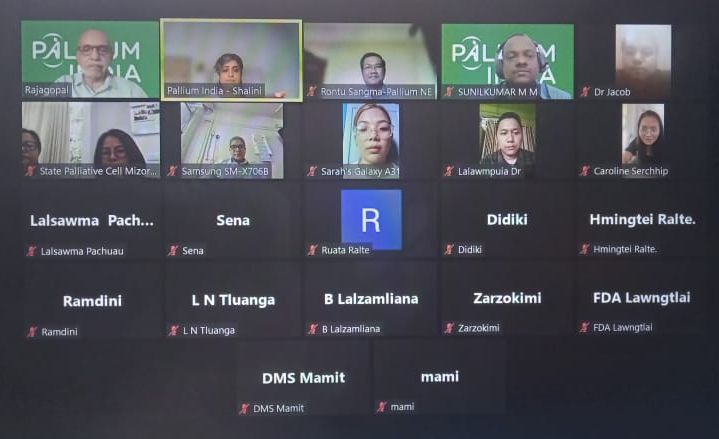
An Opioid Availability workshop was held on 20th June 2024 in Mizoram, organised by Pallium India in collaboration with the National Programme for Palliative Care (NPPC) under the National Health Mission (NHM) Mizoram. The workshop addressed critical aspects related to opioid availability, pain management, and addiction treatment.
Social Work as a Pathway to enhancing Patient Care: A Collaboration in Innovation
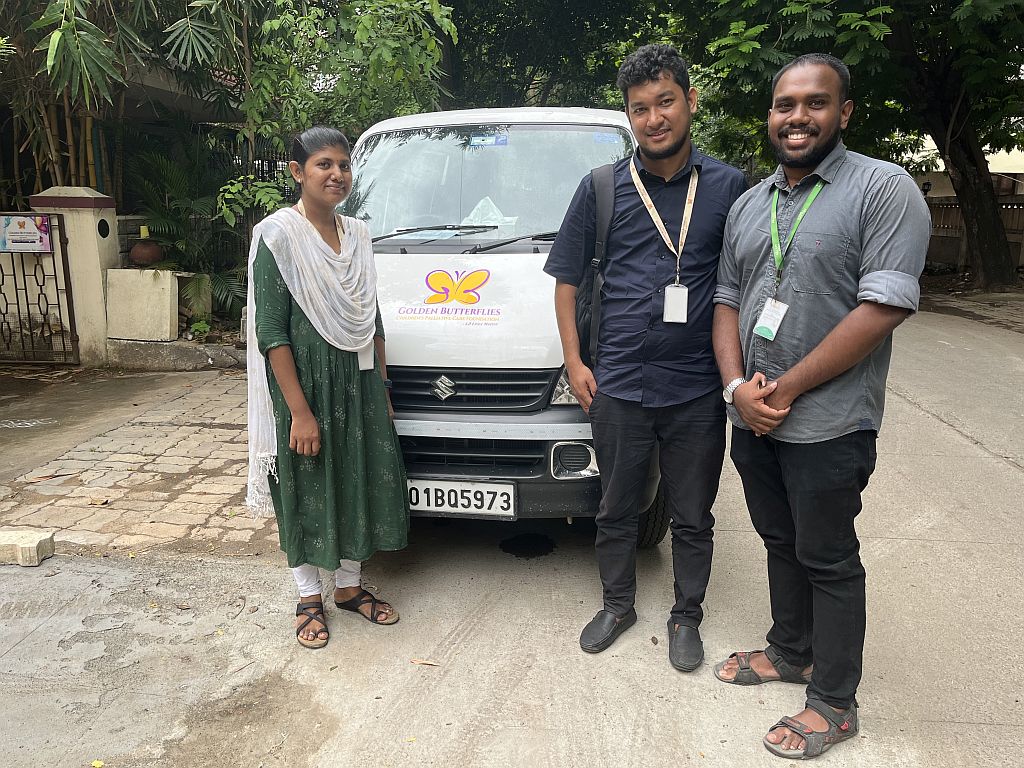
Golden Butterflies, an organization dedicated to supporting patients with compassion and care, recently sought additional training support for their social workers. To facilitate this, John Surya (Chennai-based Regional Facilitator from Pallium India), engaged in a productive interaction with Aarthi, COO of Golden Butterflies, to discuss training schedules and future plans for their social workers.
Inaugural Online Volunteers Training Program (Hindi Batch)

In an initiative to enhance volunteer engagement and support, Pallium India’s Facilitation team recently organised its first five-day online Volunteer Training Program (VTP), in Hindi. Close to 230 participants joined the session from across the country.
PHFI – Pallium India partnership renewed

Pallium India and the Public Health Foundation of India (PHFI) have renewed their partnership for another 5 years.
In the past cycle, this partnership resulted in the creation of the Certificate Course in Palliative Care (CCPC) for MD level doctors. Palliative Care experts from across the country came together to create the modules, following which virtual sessions were carried out for 4 batches.
The current terms of the partnership include updating the CCPC course and developing new courses for allied health care workers. Other capacity-building activities are also in the offing.
We at Pallium India are truly grateful for the opportunity to continue this valued partnership. PHFIs continued support and collaboration are greatly appreciated.
#FreedomFromPain
This August, as we celebrate India’s Independence Day, we call upon you to help us make the lives of patients pain-free.
A one-time donation of Rs.1947/- covers a full Home-care visit by an interdisciplinary team, including fuel / transport and medicines. Each visit to a patient’s home ensures that they are not in pain and that their other needs are also being met. For many patients, especially those without families, these visits also bring solace and comfort.
Join the #FreedomFromPain movement, and help us create a pain-free India.
Donate now, and stand for compassion, dignity, and freedom from suffering.
At the end of the month, we will publish the names of the people who have been part of the #FreedomFromPain movement, on our social media pages.
Trivandrum Institute of Palliative Sciences (TIPS), Pallium India
| Beneficiaries reached till June 2024: | 26, 423 | |
| Palliative Care centres / services catalysed: | 205 | |
| Stakeholders trained (virtual and onsite): | 10,154 |
Join us in making India pain-free! Subscribe to our newsletter for updates.
News / Articles / Opinion
Death Literacy: It’s Time We Break the Taboo and Talk about Dying
Death is seen as something inauspicious and, therefore, not discussed in Indian families. Dying and death are more often associated with anxiety, panic, anger, frustration, fear, and misery.
The idea that death can be suffering-free is somehow outside our grasp and adds to the pessimism that surrounds the end of life.
Ms Smriti Rana and Dr Parth Sharma write in The Quint. Read more >>
Overcoming Barriers to Palliative Care
Overcoming barriers to palliative care involves addressing various challenges that can hinder access to and quality of care for patients facing serious illnesses. Here are some researched strategies and approaches to tackle these barriers:
Patient advocacy and support groups in India: focus on lung cancer
In 2017, Rise To Survive, a support group for patients with ALK-positive lung cancer, was created in India.1 In 2018, a few advocates, patients with lung cancer, caregivers, and survivors came together to form, “Lung Connect India Foundation”–a support group, aimed to empower patients with lung cancer and their families, through information, resources, and support.
Bitter truth pills
A National Mental Health Survey in 2015-16 revealed that 1 in 20 Indians live with depression. The World Health Organisation estimates that 4.5% of Indians suffer from depression (56 million), with another 3.5% suffering from anxiety disorders. Stigma is rampant. This, coupled with a lack of awareness and easy access to antidepressants, means that India is staring at a potentially devastating tsunami of not just mental illness but also addiction and debilitating side effects.
India-specific guidelines for enhancing head & neck cancer treatment: A landmark initiative by the oral cancer task force
The Oral Cancer Task Force (OCTF) has made a landmark move in the fight against head and neck cancers in India by introducing comprehensive, country-specific guidelines. This initiative aims to revolutionise treatment strategies and elevate the standard of care nationwide.
India needs to focus on its senior care economy
According to the India Aging Report 2023 from UNFPA (United Nations Population Fund), the elderly population in India is projected to increase from 10.1 per cent in 2021 to 20.8 per cent by 2050. The projection coincides with declining fertility rates from 6.2 in 1950 to 2 in 2021, and higher life expectancy from 36.9 years in 1950 to an anticipated 75 years by 2050 (CBRE, 2024).
Why are some people happy when they are dying?
It may seem odd that a person could be happy as the end draws near, but in my experience as a clinical psychologist working with people at the end of their lives, it’s not that uncommon.
Unsung Heroes
Tolerance, kindness, optimism, and perseverance of nurses shall not go unnoticed…
How they treated me during my tough time helped me remain unruffled emotionally and physically to a great extent. Until that day, I never realised the significance of nurses in our lives. A kind-hearted nurse’s positive impact on a patient’s physical and emotional well-being is ineffable.
As my patient was dying, this is how we failed her
Most patients wish to die at home, but end-of-life care isn’t straightforward. Honouring their wishes requires commitment and coordination. “I can’t shake the feeling of having let down a patient who believed me when I reassured her of a peaceful death at home,” writes Ranjana Srivastava, on palliative care in Australia.
Nurturing hope: pioneering paediatric palliative care in Pakistan
My colleagues often say that seeing me (Resham) standing beside a patient’s bed or lingering outside a child’s room feels like a sign that the malik-ul-maut, or the angel of death, is near.
For a long time, most health-care professionals perceived my role in the hospital as that of the doctor responsible for withdrawing life support, the tubes and ventilators keeping a patient with terminal illness alive.
It saddens me that they still perceive my role as such, but I persevere, not missing an opportunity to educate them that my role as a palliative care physician is so much more than that.
When a loved one was dying in India, the advice I gave to my family was not what they expected
As his body faltered, he was fed by a tube, hydrated by a drip and pumped with powerful drugs. But he needed love and pain relief.
India has made many strides in healthcare … but progress has been depressingly slow when it comes to end-of-life care.
Does a Patient’s Ability to Pay For Health Care Make Their Life Worth Saving?
In this well-executed study using data from the American College of Surgeons Trauma Quality Improvement Program (TQIP), Hoit et al1 demonstrated that the timing of withdrawal of life-sustaining treatment (WLST) in critically injured adults between ages 18 and 64 years was statistically associated with the type of insurance they carried.
Congratulations, Swarga Foundation
All of us at Pallium India congratulate our fellow travellers in Coimbatore, Swarga Foundation, for winning the NDTV Infrasakthi People’s Choice Award.
Congratulations, Swarnalatha J, Founder and Managing Trustee of Swarga Foundation.
We are proud that her husband Mr T S Guruprasad is one of the trustees of Pallium India, representing caregivers.
Palliative care awareness session at Thiruvananthapuram Medical College

In line with Pallium India’s vision of integrating palliative care in all health care, our teams have been constantly working on creating awareness about Palliative care as well as integrating palliative care into routine health care.
With the support of the Palliative Care Nodal Officer Dr. Sheela Rani, Pallium india team posted at Government Medical College, Thiruvananthapuram, organised a session on Introduction to Pain and Palliative Care for the staff, including faculties and postgraduate residents of Radiotherapy Department.
Under the efficient leadership of Dr. Nayana Mary Francis, this session was facilitated by Dr. Sunil Kumar M.M , Additional Director, TIPS, Pallium India, on July 24th 2024. Around 25 doctors attended the event, with many expressing interest in enrolling in formal training programmes to further their understanding of palliative care.
Events / Trainings / Conferences
Essentials of Palliative Care – India (EPCI)
Self-Directed learning course for Nurses and Doctors
6 weeks Certificate Course for doctors & nurses at Trivandrum
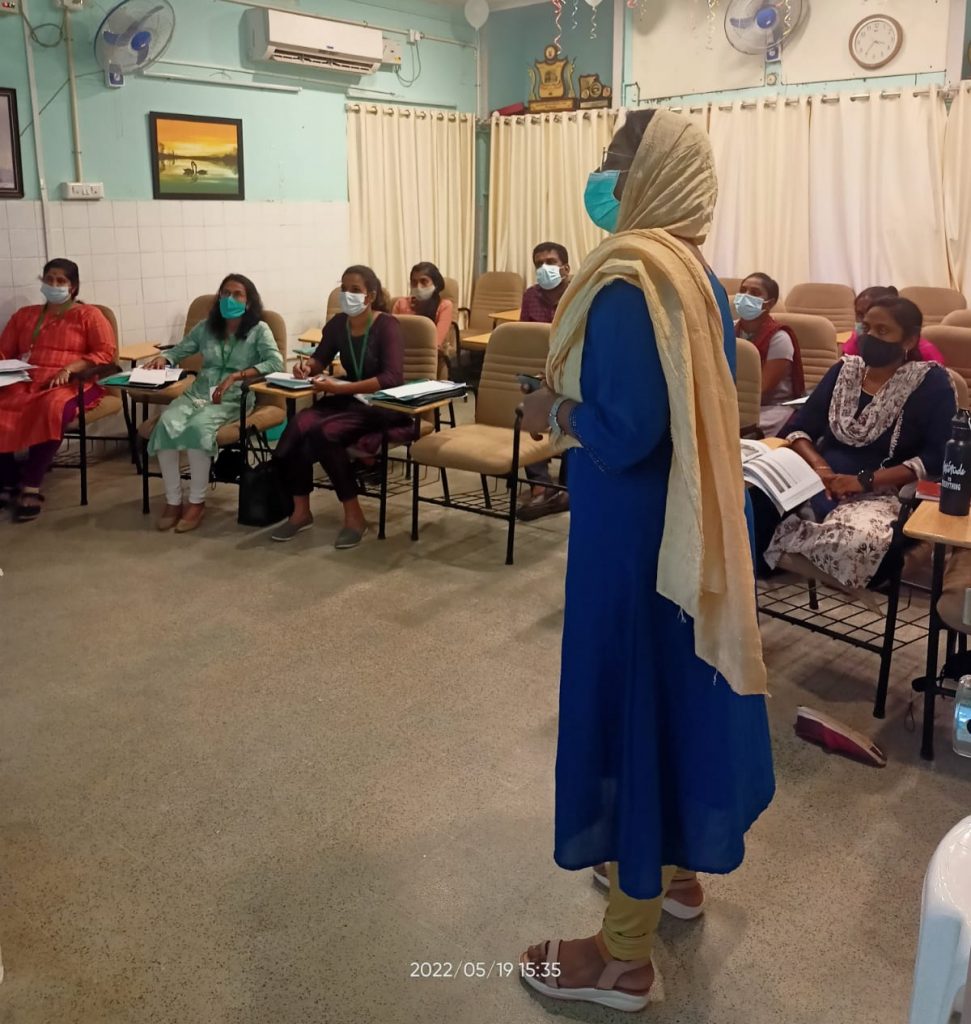
We invite doctors and nurses to join this six weeks certificate course in pain management and palliative care, at Trivandrum.
Start Date: October 7, 2024
Doctors: MBBS or BDS
Nurses: Any recognised degree or certificate in nursing
Public Health Forum on Health Financing in India

Health financing in India has gained significant public attention over recent past. However, besides people trained in public health, most people find it difficult to understand how health is financed in India and what its changing trend means for each one of us.
In this forum discussion, experts help us in understanding the basics of health financing in India. The objectives of this forum discussion are: 1. To educate the audience about how health is financed in the country. 2. To discuss why poor health financing is a problem everyone should be aware of. 3. To educate the audience on the difference between central and state health budgets, the funding and importance of each. 4. To discuss solutions to the problem at the end – what role do policymakers, researchers, journalists and the general public play in addressing this issue of poor financing of health in India.
Click here to register for this event
Work for Palliative Care
For more openings across the country, visit our CAREERS page:
https://palliumindia.org/category/career
In case of queries, please write to us: [email protected]
Book of the Month
‘With The End In Mind’ by Dr. Kathryn Mannix
Written with warmth and interspersed with humour when you least expect to laugh, With the End in Mind helps us to understand the dying process through the eyes of an accomplished palliative care physician.
Dr. Kathryn Mannix takes us through real life stories from the bedside of dying patients she has cared for.
There are many long held myths about dying that make death something to be afraid of. Dr. Mannix helps us to shift that perspective and accept death as it should be – with the grace and respect due to the one certainty in life.

Visit Dr Kathryn Mannix’ website to know more about With the End in Mind
BLOGS
Access to Medicines: A Cornerstone of the Right to Health

This article series by Dr Preeti Chauhan (Head – National Policy, Pallium India) draws upon the foundational knowledge presented during Day 1 of the five-day training on “Access to Medicines, TRIPS, and Patents in the Developing World,” organized by the Third World Network and Inter-University Centre for IPR Studies (IUCIPRS), CUSAT. The content is adapted from the core concepts introduced by Dr. Arathi PM, Mahatma Gandhi University, whose expertise was instrumental in shaping the understanding of the complex interplay between health rights, intellectual property, and access to medicines in developing countries.
The right to health, as enshrined in various international treaties and declarations, is a fundamental human right. Central to its realization is the accessibility of essential medicines. This article delves into the complexities surrounding access to medicines, particularly in the developing world, and its intricate relationship with intellectual property rights (IPRs) such as patents and Trade-Related Aspects of Intellectual Property Rights (TRIPS).
A Home-Visit, away from Home
Just a few days into joining Pallium India, and moving to Trivandrum, Kerala, I had the chance to go out on a field visit with the Home Care Team.
I was a fish out of water here, with respect to the location of Kerala, the people, the language, the culture and of course a novice in the world of Palliative Sciences.
I saw the role of caregivers in a patient’s family suffering from chronic illness for a long time. Their patience, determination and act of serving and caring for their loved ones goes beyond words. I never knew that providing palliative care is so comprehensive, inclusive.
Sayanditya Sen (Assistant Manager – Resource Mobilization, Pallium India) writes in ehospice India. Read more >>

Video of the Month
How I made friends with reality: Emily Levine
In this TED talk, Emily Levine takes us on her journey to make friends with reality – and peace with death. Life is an enormous gift, Levine says: “You enrich it as best you can, and then you give it back.”
Click here to watch the video: https://www.ted.com/talks/emily_levine_how_i_made_friends_with_reality
Subscribe to Pallium India’s youtube channel for videos related to palliative care and our activities. You can watch previous webinars and training sessions, as well as listen to caregivers, survivors and others sharing their experiences.
‘A must-read for anyone interested in end of life care’
‘സ്നേഹം സാന്ത്വനം’ വാങ്ങാൻ ഇവിടെ പോകുക
Kunjamma writes: “രാജഗോപാലൻ സാർ വളരെ വിശദമായി നല്ല ഭാഷയിൽ ഖലീൽ ജിബ്രാനെയും പൗലോ കൊയിലോയേയും ഒക്കെ സാക്ഷിനിർത്തി എഴുതിയിരിക്കുന്നത് കാണുമ്പോൾ, അതു വായിക്കുമ്പോൾ ഞാൻ അനുഭവിക്കുന്ന സന്തോഷം അത്ര ചെറുതൊന്നുമല്ല.
സാറിന് മാത്രമാണ് ഇങ്ങനെ ഒരു പുസ്തകം എഴുതാനുള്ള അവകാശം എന്ന് പോലും ഞാൻ വിശ്വസിക്കുന്നു. ഇന്ന് നമ്മുടെ രാജ്യം പ്രത്യേകിച്ച് കേരളം, അതിന്റെ ചെറിയ ചെറിയ മൂലകളിൽ പോലും സ്വാന്ത്വന ചികിത്സയുടെ സന്തോഷങ്ങൾ അനുഭവിക്കുന്നുവെങ്കിൽ നമ്മൾ നന്ദി പറയേണ്ടത് രാജഗോപാൽ സാറിനോടാണ്..”
Click here to purchase your copy
Vasudha K. writes: “One of the central themes of the book (Walk with the Weary) is the importance of compassionate care. The author emphasises that it is not just about curing diseases, but about caring for the patient as a whole. He shares his personal reflections, emotional highs and lows, and the lessons learnt from the patients he cared for, thus giving the book a very personal touch.
Dr Rajgopal advocates for better palliative care policies and practices in India and describes his efforts to do the same.
In a culture where discussion on death is considered a taboo and a bad omen, this book is a must read for anyone who is interested in knowing about the end-of-life care. This book is all about a more empathetic and compassionate approach to healthcare.”
Palliative Care Telehealth
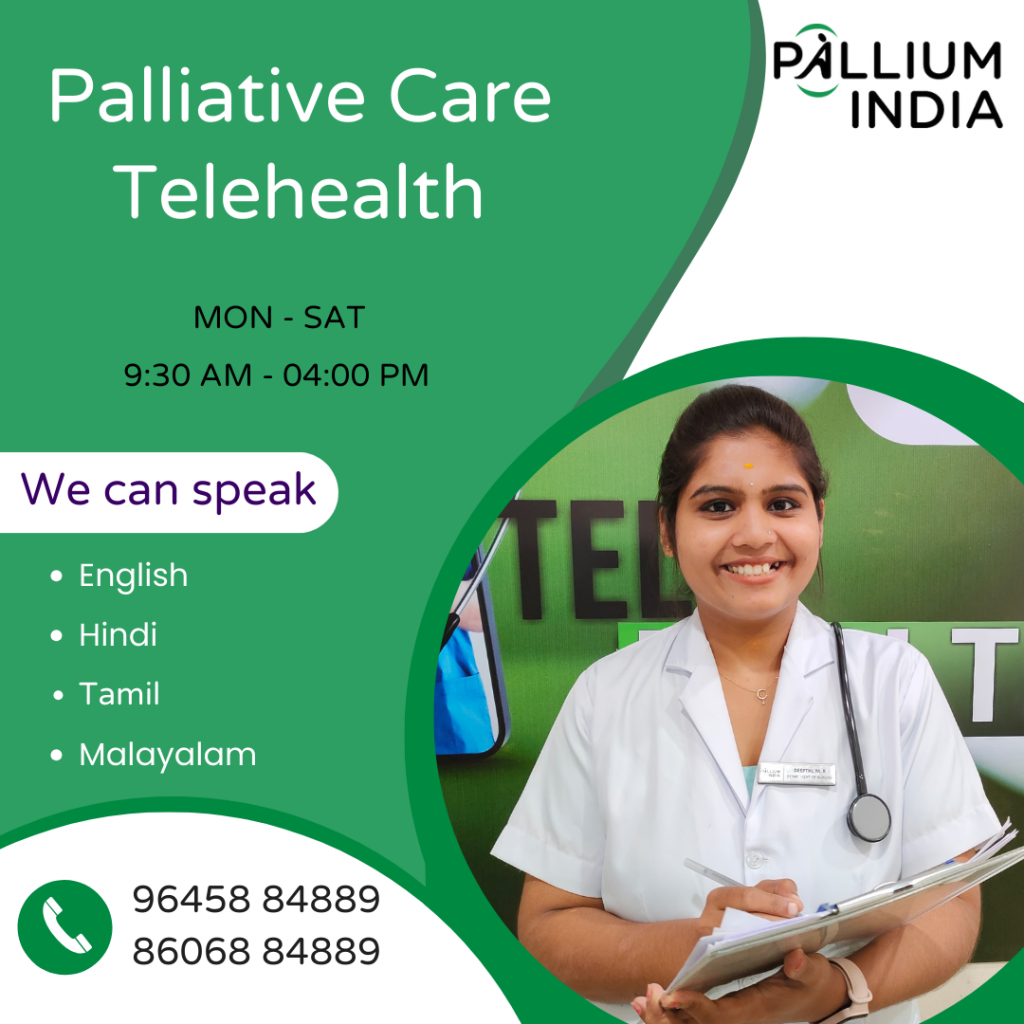
Call us: +91 964 588 4889 / +91 860 688 4889
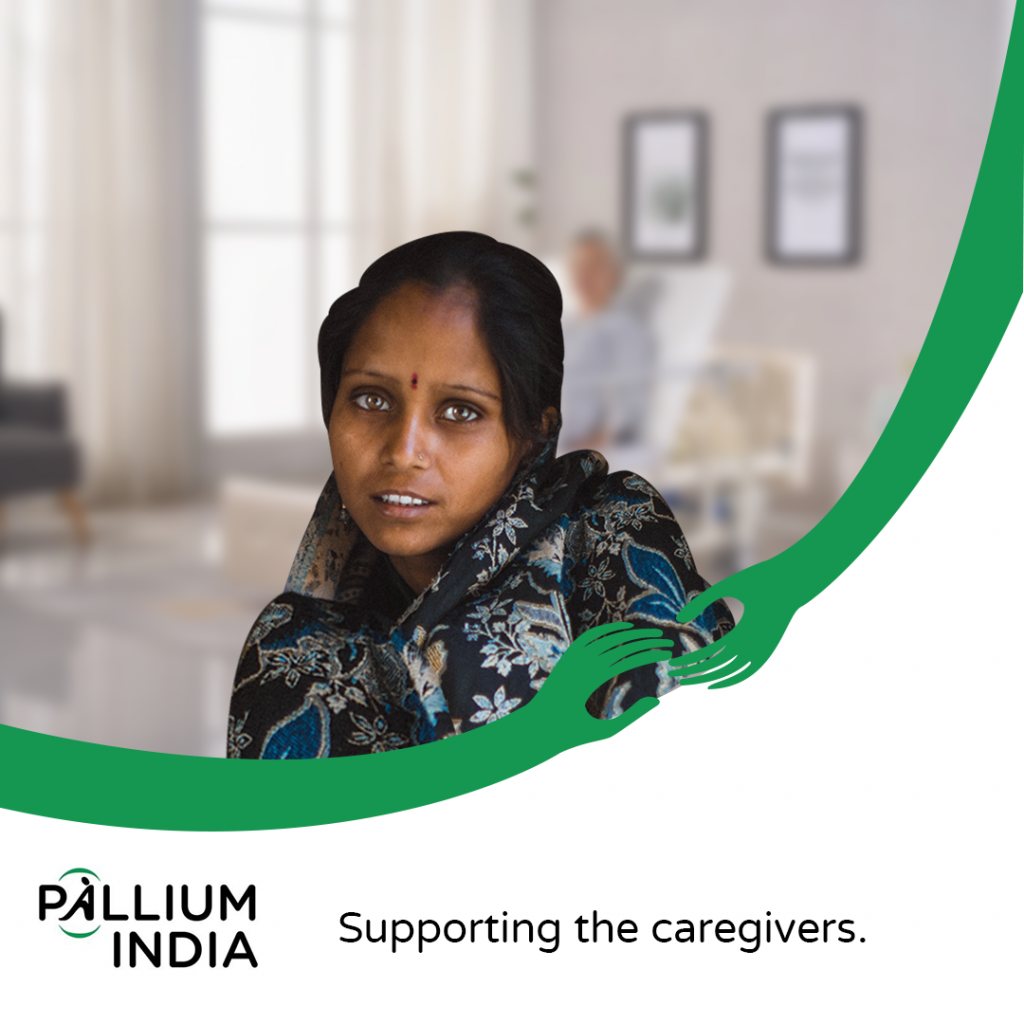


For More about Palliative Care – Follow us on Instagram
PARTING SHOT
“Food is my love language”

Vandana Mahajan writes:
It’s been many years since I have been working in cancer Palliative care. There have been numerous occasions when I have sat with a family whose loved one is dying. One of the points of discussion in the counselling sessions has been – FOOD!
Yesterday I was talking to Arun*, whose family member, Suman*, is at EOL. Suman has been sleeping for prolonged periods throughout the day. She wakes up in between and goes to sleep again. Her appetite is poor, she doesn’t ask for food and when they do feed her, she has difficulty in swallowing.
I said to Arun that force feeding may cause further complications. She may aspirate. Aspiration occurs when food, drink, or foreign objects are breathed into the lungs (going down the wrong tube). I told Arun to give her food if she asks for it; otherwise let her sleep.
Arun said, “How can we not feed her? Won’t she die of starvation? We can’t do that to her.”
This is a dilemma that all caregivers face when someone they love is dying. Food is love and love is all about emotions. At this point, supporting the caregiver and providing proper guidance about food and dying is needed. It’s important to explain to the family that as much as feeding their loved ones is an act of love, it’s not useful at EOL.
It’s important to explain to the family that as much as feeding their loved ones is an act of love, it’s not useful at End of Life.
The appetite reduces because, in simple terms, the cancer burden increases so much that it hinders or prevents the normal bodily functions. Arun and I also spoke about the futility of a ryles tube/ peg tube. It took some time to explain to Arun but eventually he understood.
From a caregiver’s perspective it’s very hard. Food has always been directly linked to LIFE. To deprive the one they love, of what gives life can be very traumatic for the family. The role of the Palliative care team in such cases becomes very important. Explaining the difference between starvation and Cachexia is important.
Supporting the caregiver with evidence-based reasoning can help reduce not only their distress but also save the patient from complications.
“Food is symbolic of love when words are inadequate.” – Alan D. Wolfelt
This is true but in those who are dying, holding their hands and telling them how much they are loved is a better expression of LOVE!
* Names have been changed to protect identity.
(Vandana Mahajan is a Palliative care counsellor with over ten years’ experience in counselling and providing psychological support to cancer patients and their families. She is a passionate patient advocate and a dear friend of Pallium India’s.)
Follow us on Social Media for updates
Contact us: [email protected] / 97467 45497
Thank you for reading our newsletter. Read previous issues here
Don’t miss any updates! Subscribe to receive our monthly newsletter via email: https://www.freelists.org/list/palliumindia
Have feedback? Let us know. Write to us: [email protected]





